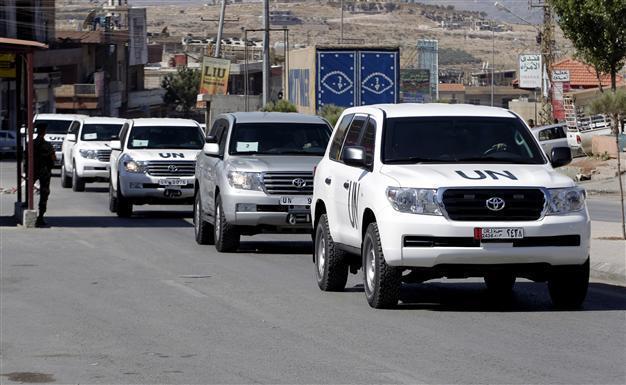Syria arms inspectors face unprecedented danger: UN
UNITED NATIONS, United States - Agence France-Presse

AP Photo
The United Nations warned Monday that inspectors face a year-long mission of unprecedented danger in trying to destroy Syria's chemical weapons arsenal, as rebels launched a major offensive.In a report to the UN Security Council seen by AFP, Secretary General Ban Ki-moon said it would take 100 foreign experts to complete "an operation the likes of which, quite simply, has never been tried before." Ban set out a blueprint for the most dangerous disarmament operation ever staged, even as the United States and Russia praised steps taken so far by President Bashar al-Assad's government.
But a major rebel assault in northwest Syria highlighted the looming threats to inspectors from the joint United Nations and Organization for the Prohibition of Chemical Weapons (OPCW) mission.
The two international bodies have had to speedily gather a team after a Security Council resolution endorsed a Russian-US disarmament plan on September 27.
The plan was launched after a chemical weapons attack near Damascus on August 21, in which hundreds -- Washington claims around 1,400 -- people died.
US President Barack Obama initially threatened a punitive military strike but when he struggled to win international or even domestic support for such a move agreed to a Russian disarmament plan.
Russia and the United States have the ambitiously aim to seize and destroy Syria's huge chemical weapons arsenal, estimated at 1,000 tonnes, by mid-2014.
Some 19 OPCW arms experts and 16 UN logistics and security personnel are in Syria and hav started to destroy weapons production facilities. Ban recommended the team be increased to about 100 scientists, logistics and security experts who will stay for up to a year.
The mission will have bases in Damascus and Cyprus.
Ban highlighted the threat to the experts and Syrian civilians from the sarin, mustard gas and other chemical horrors which are to be moved amid the "carnage" of Assad's daily battle with rebels.
The experts will have to work in "dangerous and volatile" conditions, particularly in urban areas such as Damascus, Homs and Aleppo, the UN leader warned.
"Heavy artillery, air strikes, mortar barrages and the indiscriminate shelling of civilians areas are commonplace and battle lines shift quickly," he added.
Syria has already made a declaration of its weapons facilities. And the UN resolution set a November 1 deadline for the eradication of production and chemical mixing facilities. That work started Sunday when the first "missile warheads, aerial bombs and mixing and filling equipment" were cut up and destroyed, according to the UN.
Western countries blame Assad for the August 21 chemical attack, while his ally Russia blames the rebels.
Assad admitted in a recent television interview that his government had made "mistakes" in the country's 30-month old conflict in which the UN says well over 100,000 people have been killed. But he again denied responsibility for the Damascus attack.
The Security Council resolution passed on September 27 threatened "measures" under Chapter VII of the UN Charter if an infringement of the disarmament accord is proved. Chapter VII allows for possible military action or sanctions.
But US Secretary of State John Kerry welcomed progress made so far in the disarmament operation.
"I think it's extremely significant that yesterday, Sunday, within a week of the resolution being passed, some chemical weapons were being destroyed," Kerry told reporters in Indonesia after talks with Russia's Foreign Minister Sergei Lavrov.
"I think it's a credit to the Assad regime, frankly. It's a good beginning and we welcome a good beginning." On the ground Monday, Assad's army reopened the only supply route linking central Syria with the northern city of Aleppo after a year of fierce fighting.
But rebels launched a major assault on two key military bases in northwestern Syria, with at least 14 people killed in the heaviest fighting the area has seen in months, activists said.
The offensive -- dubbed "The Earthquake" -- was aimed at seizing Wadi Deif and Hamidiyeh in Idlib province, which insurgents have besieged for almost a year, said the Syrian Observatory for Human Rights.
Rebel rocket and mortar fire killed at least 10 soldiers and destroyed three tanks, said the British-based Observatory. Four rebel fighters were killed in the clashes.
Assad forces used helicopters to bombard rebel positions around the two bases with barrels filled with explosives, it added.
Elsewhere in the country, military air raids killed at least 10 people in Hammuriyeh, east of Damascus, said the Observatory.
Air strikes also killed six people in Shaddadeh, an eastern town held by the jihadist Al-Nusra Front and the Al-Qaeda-affiliated Islamic State of Iraq and the Levant (ISIL), it added.
















